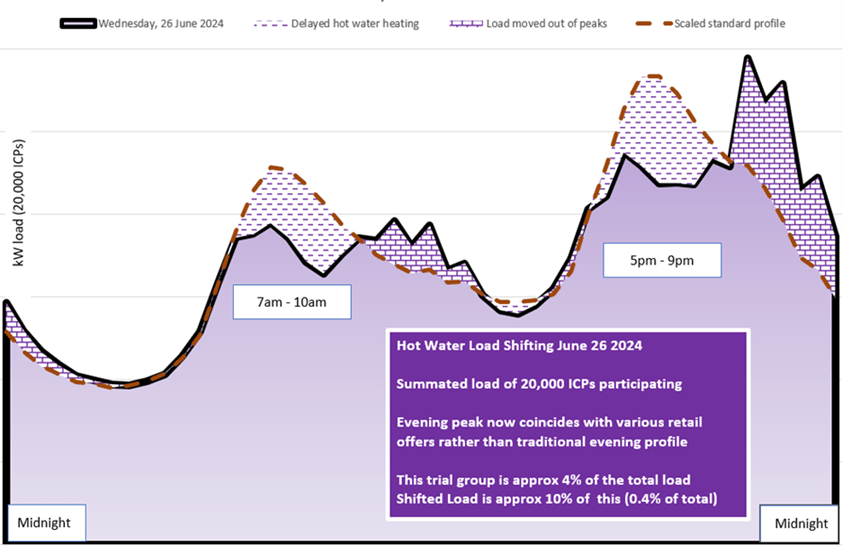Residential hot water control trial insights
Published September 2024
When competing energy retailers approached us about trialling new smart meter technology to control hot water heating, we saw the opportunity for industry collaboration to benefit residential customers.
By putting the customer at the centre of our decision making and being open and transparent throughout, we’ve worked to make the trials happen for multiple competing retailers while still having ripple hot water control available when required.
This was able to be achieved while our ripple control of hot water was still available should it have needed to be used for network or system operator purposes.
The collaborative approach of the trial has led to great insights into load profiles at the trial sites and has resulted in little impact on customers’ hot water temperature. The trial data indicates that there is real potential for positive change in terms of load management, pricing signal adjustments and retailer product offerings.
Mercury, Contact Energy, Electric Kiwi and Genesis have initially been involved in trials on Powerco’s network, with other retailers also looking to run future trials.
With that initial trial proving successful, retailers are now also trialling larger numbers of customer connections on our network.
Industry collaboration
In a trial involving more than 20,000 residential connections across our electricity network during 2024, we worked with a number of retailers and metering equipment providers to test technology to enable electricity demand flexibility.
For example, Mercury completed a successful hot water load control trial with 13,000 residential customers on the Powerco network during winter. This included trialling different control periods tailored to household historical usage patterns.
Powerco currently has the ability to control approximately 195,000 hot water cylinders of homes and businesses, through traditional ripple hot water control. However, emerging technology allows such control to be more responsive to network demand or pricing signals.
Electric hot water accounts for about 30% of power bills and many residential hot water systems are heating all the time. Enabling retailers to switch off hot water cylinders to avoid peak times when electricity prices are higher, without affecting customers’ hot water supply, has the potential to reduce power bills.
Mercury Innovation Specialist Jeremy Levy says Powerco was a pragmatic, transparent and collaborative trial partner.
“It was great to work with Powerco on this trial, which has shown what’s possible in this space. We are excited for the future potential of initiatives like this, which help manage pressure on the national grid and ultimately reduce carbon emissions."
Shifting load out of network peaks: The major network hypothesis in the trial was that periods of retailer control lined up positively with periods where the network may be constrained, such as peak load periods.
Improved network efficiency: By reducing peak demand, the trial showed new methods to optimise network performance.
Enhanced customer options: Customers will benefit from increased retailer control over their energy consumption and potential cost savings.
Demonstrated potential for new business models: The success of the trial has opened doors for exploring innovative pricing and service offerings for retailers and Powerco.
Stronger industry collaboration: The project has fostered successful partnerships between Powerco and retailers by enabling the controllable load to be used for lots of different things – avoiding high energy prices and reducing network peaks.
The following graph shows trial data from Wednesday 26 June 2024.

